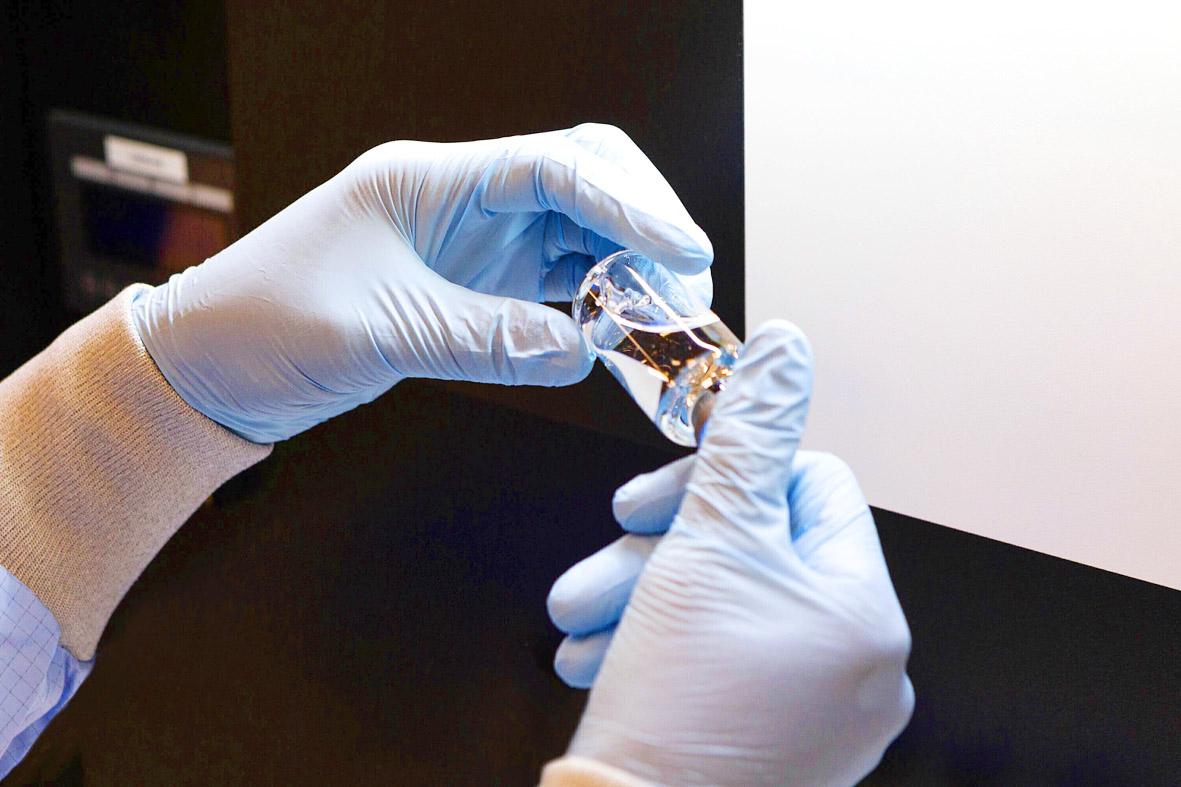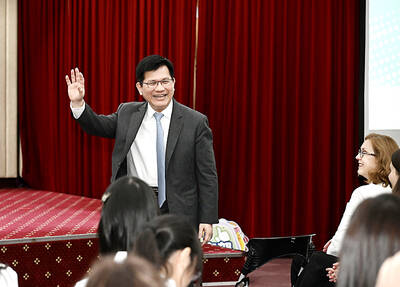More than half of a group of severely ill COVID-19 patients improved after receiving an experimental antiviral drug, although there is no way to know the odds of that happening without the drug, because there was no comparison group, doctors said on Friday.
The results published in the New England Journal of Medicine are the first in COVID-19 patients for remdesivir.
The Gilead Sciences drug has shown promise against other coronaviruses in the past and in lab tests against the one causing COVID-19, which has claimed more than 100,000 lives.

Photo: AP
No drugs have been approved for treating the disease. At least five large studies are testing remdesivir, and the company also has given it to more than 1,700 patients on a case-by-case emergency basis.
Friday’s results are on 53 of those patients, ages 23 to 82, hospitalized in the US, Europe, Canada and Japan. Thirty-four of them were sick enough to require breathing machines.
All were given the drug intravenously for 10 days or as long as they tolerated it.
After 18 days on average, 36 patients, or 68 percent, needed less oxygen or breathing machine support.
Eight others worsened. Seven patients died, nearly all of them older than 70.
The 13 percent mortality rate is lower than seen in some other reports, but no true comparisons can be made without a study rigorously testing the drug in similar groups of patients, the authors said.
A dozen patients had serious problems, but it was not clear whether they were from the drug or their disease. Those included septic shock and trouble with kidneys and other organs. Four discontinued treatment because of health problems they developed.
“It looks encouraging,” said Elizabeth Hohmann, an infectious disease specialist at Massachusetts General Hospital who is helping lead one of the studies testing the drug.
The problems that occurred were not unexpected given the disease, she said.
Derek Angus, critical care chief at the University of Pittsburgh Medical Center who was not involved with the research, said the recovery rate is good, but “there is no way of knowing from this series if remdesivir was helpful.”
“We cannot draw definitive conclusions from these data, but the observations from this group of hospitalized patients who received remdesivir are hopeful,” said lead author Jonathan Grein, director of hospital epidemiology at Cedars-Sinai Medical Center in Los Angeles, in a statement from Gilead.
The Foster City, California-based company provided the medication and also helped analyze the results.
Results from more rigorous studies are expected by the end of this month.
Additional reporting by Bloomberg

FIREPOWER: On top of the torpedoes, the military would procure Kestrel II anti-tank weapons systems to replace aging license-produced M72 LAW launchers Taiwan is to receive US-made Mark 48 torpedoes and training simulators over the next three years, following delays that hampered the navy’s operational readiness, the Ministry of National Defense’s latest budget proposal showed. The navy next year would acquire four training simulator systems for the torpedoes and take receipt of 14 torpedoes in 2027 and 10 torpedoes in 2028, the ministry said in its budget for the next fiscal year. The torpedoes would almost certainly be utilized in the navy’s two upgraded Chien Lung-class submarines and the indigenously developed Hai Kun, should the attack sub successfully reach operational status. US President Donald Trump

Taiwan Semiconductor Manufacturing Co (TSMC, 台積電) is expected to start construction of its 1.4-nanometer chip manufacturing facilities at the Central Taiwan Science Park (CTSP, 中部科學園區) as early as October, the Chinese-language Liberty Times (the Taipei Times’ sister newspaper) reported yesterday, citing the park administration. TSMC acquired land for the second phase of the park’s expansion in Taichung in June. Large cement, construction and facility engineering companies in central Taiwan have reportedly been receiving bids for TSMC-related projects, the report said. Supply-chain firms estimated that the business opportunities for engineering, equipment and materials supply, and back-end packaging and testing could reach as high as

ALL QUIET: The Philippine foreign secretary told senators she would not respond to questions about whether Lin Chia-lung was in the country The Ministry of Foreign Affairs on Wednesday confirmed that a business delegation is visiting the Philippines, but declined to say whether Minister of Foreign Affairs Lin Chia-lung (林佳龍) is part of the group, as Philippine lawmakers raised questions over Lin’s reported visit. The group is being led by Deputy Minister of Agriculture Huang Chao-chin (黃昭欽), Chinese International Economic Cooperation Association (CIECA) chairman Joseph Lyu (呂桔誠) and US-Taiwan Business Council (USTBC) vice president Lotta Danielsson, the ministry said in a statement. However, sources speaking on condition of anonymity said that Lin is leading the delegation of 70 people. Filinvest New Clark City Innovation Park

DEFENSIVE EDGE: The liaison officer would work with Taiwan on drones and military applications for other civilian-developed technologies, a source said A Pentagon unit tasked with facilitating the US military’s adoption of new technology is soon to deploy officials to dozens of friendly nations, including Taiwan, the Financial Times reported yesterday. The US Department of Defense’s Defense Innovation Unit (DIU) is to send a representative to collaborate with Taiwan on drones and military applications from the semiconductor industry by the end of the year, the British daily reported, citing three sources familiar with the matter. “Drones will certainly be a focus, but they will also be looking at connecting to the broader civilian and dual-use ecosystem, including the tech sector,” one source was